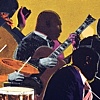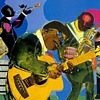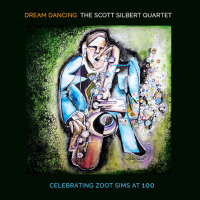Race and Jazz
Gregory Thomas examines the controversial issue of race and jazz.
Wynton Marsalis and Confederate Monuments: How a Jazz Musician Started a Political Movement

by Dustin Mallory
In the wake of the events that took place in Charlottesville, VA on August 11-12, the nation has been gripped by horrific violence and tragedy. Our screens have been filled with images of white nationalists, neo-Nazis, and the counter-protestors who clashed with them. The Unite the Right rally may have ended in chaos, but it began as a protest to oppose the removal of the Robert E. Lee statue. This removal was not the first, but part of a series ...
Continue ReadingBAM or JAZZ: Part Two!

by Greg Thomas
Jazz, an art form given birth in the United States by descendents of the formerly enslaved, has a complicated relationship with race. Although race, as a popular idea, has no basis in biology, many people mentally adhere to the idea of dividing groups of people based on “race" as opposed to understanding how groups of people evolve (or regress) via culture, so very real social dynamics and results exist based on the belief in race. A key ...
Continue ReadingBAM or JAZZ: Why It Matters

by Greg Thomas
Since the last Race and Jazz column, the first of a multi-part discussion with John Gennari--the top scholar on the history of jazz criticism--a firestorm of controversy has arisen surrounding Nicholas Payton's declaration that, to him, the word jazz is dead. He also feels that the word jazz is tantamount to or worse than the “n" word--nigger--and that the best and most descriptive umbrella term is Black American Music: BAM.We'll continue sharing our conversation with Professor Gennari soon, ...
Continue ReadingRace and Jazz Criticism

by Greg Thomas
When I began this Race and Jazz series several months ago, I knew the topics I wanted to touch upon, and the general culture vs. race point-of-view I intended to pursue. With those chord changes (topics) and that melodic perspective (pro-culture, anti-race) in mind and at play, I figured I'd proceed with the rest by ear. As it turned out, the most recent column featured an interview with premier jazz critic and book author Gary Giddins, in which he discussed ...
Continue ReadingGary Giddins on Ignored Black Jazz Writers

by Greg Thomas
In the first essay for the Race and Jazz column, I gave a first-person account of how my love and appreciation of certain “white" saxophonists served to safeguard me from the temptation of racism back in college during the early-to-mid-'80s. My second essay privileged culture over race, and told the story of how attorney and constitutional law professor Charles L. Black's love of Louis Armstrong's genius from the early '30s gave him a way out of the morass of Southern ...
Continue ReadingRace, Culture and a White Boy from Texas

by Greg Thomas
The date: October 12, 1931. A sixteen year-old white male from Austin High School in Texas, who in later years would help shape the future of the United States, bought a ticket to see “Louis Armstrong, King of the Trumpet, and His Orchestra" at the old Driskill Hotel. He knew nothing about jazz or this “King," he recalled many years later, but did predict that a lot of girls would be at the dance. So, of course, he figured he ...
Continue ReadingJazz vs Racism

by Greg Thomas
Jazz saved me from becoming a racist. Back in the early to mid-1980s, while attending Hamilton College in central New York, I learned details about the transatlantic slave trade that sickened and angered me. I read about the history of the abolitionist movement in the 1800s, and the civil rights movements of last century, as well as the apartheid-like Jim Crow system that arose in between those movements. “Jim Crow," particularly in the U.S. South, maintained the ...
Continue Reading












